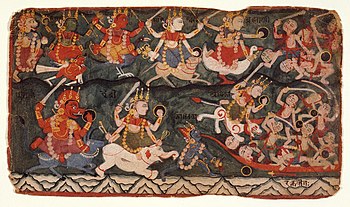Raktabīja
In Hindu mythology, Raktabīja was an asura (loosely translated as demon) who fought with Shumbha and Nishumbha against Goddess Parvati and Goddess Kali or Goddess Chamunda. Raktabīja had a boon that whenever a drop of his blood fell on the ground, a duplicate Raktabīja would be born at that spot (rakta = blood, bīja = seed; "he for whom each drop of blood is a seed"). According to some sources, Raktabija was, in his previous birth, Rambhasura, king of demons and the father of Mahishasura.
| Raktabīja | |
|---|---|
 The Goddess Ambika Leading the Eight Matrikas in Battle Against the Demon Raktabija, folio from a Devi Mahatmya — (top row, from the left) the Matrikas: Narasimhi, Vaishnavi, Kumari, Maheshvari, Brahmi; (bottom row, from left) Varahi, Aindri, Chamunda or Kali (drinking the demon's blood), Ambika; on the right, demons arising from Raktabiīa's blood |
The eighth chapter of the Devi Mahatmya, raktabIja-vadh, focuses on Ambika's battle with Raktabīja as part of her battle against the asuras Shumbha and Nishumbha, who had disenfranchised the gods from heaven. Raktabīja was wounded, but drops of blood falling on the ground created innumerable other Raktabījas, and Ambika and the Matrikas were in difficulty. At this point, the Goddess Kali joined the battle, who collected blood pouring from Raktabīja's body in a bowl while other goddesses wounded him. Kali devoured his duplicates into her gaping mouth. This form who drank the demon's blood is also called Raktheshwari.
Ultimately, Raktabīja was annihilated.
According to popular folklore, after killing Raktabīja and most of his entire army, Goddess Kali went on to kill all creatures in a fury, but was timely intervened by Lord Shiva who laid himself in her path. Striking his body, Kali was shaken and embarrassed and took out her tongue in shame. This act has been depicted in many Hindu paintings and portraits.
There are references of Kali not being created but having sprung from Durga's forehead as they were all the same goddess in different forms.
See also
- Markandeya Purana
- Chandi di Var
- Munda
- Chanda
- Sumbha and Nisumbha
References
- Dictionary of Hindu Lore and Legend (ISBN 0-500-51088-1) by Anna Dhallapiccola
- Devi Mahatmya, Chapter Eight.
